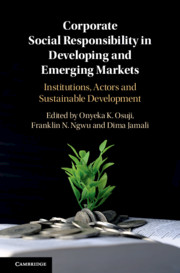 Corporate Social Responsibility in Developing and Emerging Markets
Corporate Social Responsibility in Developing and Emerging Markets from Part II - CSR and Sustainable Development Cross-Country Studies
Published online by Cambridge University Press: 18 December 2019
This chapter builds on the institutional voids literature within institutional theory by highlighting the role that multinational corporations can play when policy voids are severe, as is the case in many developing countries. We utilize an in-depth narrative case study of Nestlé’s operations in Thailand to elucidate the institutional and policy voids and then to show how Nestlé worked to fill these voids. Specifically, this chapter documents the history of slavery and child labor in Thailand and how international and domestic policy efforts have failed to address these issues in a political environment that is rife with corruption and abuse. Instead, corporations like Nestlé are filling this policy void with efforts like the Seafood Task Force, which aims to alleviate human rights abuses by eliminating them at the source.
To save this book to your Kindle, first ensure [email protected] is added to your Approved Personal Document E-mail List under your Personal Document Settings on the Manage Your Content and Devices page of your Amazon account. Then enter the ‘name’ part of your Kindle email address below. Find out more about saving to your Kindle.
Note you can select to save to either the @free.kindle.com or @kindle.com variations. ‘@free.kindle.com’ emails are free but can only be saved to your device when it is connected to wi-fi. ‘@kindle.com’ emails can be delivered even when you are not connected to wi-fi, but note that service fees apply.
Find out more about the Kindle Personal Document Service.
To save content items to your account, please confirm that you agree to abide by our usage policies. If this is the first time you use this feature, you will be asked to authorise Cambridge Core to connect with your account. Find out more about saving content to Dropbox.
To save content items to your account, please confirm that you agree to abide by our usage policies. If this is the first time you use this feature, you will be asked to authorise Cambridge Core to connect with your account. Find out more about saving content to Google Drive.